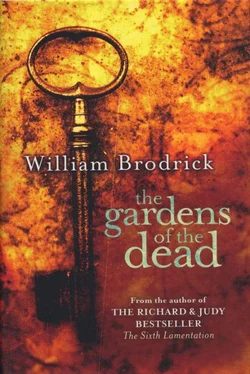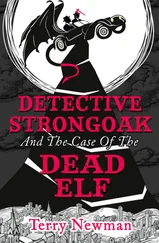William Brodrick - The Gardens of the Dead
Здесь есть возможность читать онлайн «William Brodrick - The Gardens of the Dead» весь текст электронной книги совершенно бесплатно (целиком полную версию без сокращений). В некоторых случаях можно слушать аудио, скачать через торрент в формате fb2 и присутствует краткое содержание. Жанр: Триллер, на английском языке. Описание произведения, (предисловие) а так же отзывы посетителей доступны на портале библиотеки ЛибКат.
- Название:The Gardens of the Dead
- Автор:
- Жанр:
- Год:неизвестен
- ISBN:нет данных
- Рейтинг книги:4 / 5. Голосов: 1
-
Избранное:Добавить в избранное
- Отзывы:
-
Ваша оценка:
- 80
- 1
- 2
- 3
- 4
- 5
The Gardens of the Dead: краткое содержание, описание и аннотация
Предлагаем к чтению аннотацию, описание, краткое содержание или предисловие (зависит от того, что написал сам автор книги «The Gardens of the Dead»). Если вы не нашли необходимую информацию о книге — напишите в комментариях, мы постараемся отыскать её.
The Gardens of the Dead — читать онлайн бесплатно полную книгу (весь текст) целиком
Ниже представлен текст книги, разбитый по страницам. Система сохранения места последней прочитанной страницы, позволяет с удобством читать онлайн бесплатно книгу «The Gardens of the Dead», без необходимости каждый раз заново искать на чём Вы остановились. Поставьте закладку, и сможете в любой момент перейти на страницу, на которой закончили чтение.
Интервал:
Закладка:
‘When’s she coming back?’ said Mrs Dixon anxiously ‘I’ve missed her… The stories, the cakes and all that…’
Mrs Dixon fell back into an armchair before a crowded coffee table. A dinner plate with swirls of gravy lay in the centre. A button nose and pink cheeks suggested a rag doll. Her hair was curled and faintly blue.
Anselm said, ‘I’m here to tell you that Mrs Glendinning won’t be coming any more. I’m very sorry.
Mrs Dixon lined up her knife and fork. ‘She’s dead?’
‘Yes.’
‘Her heart?’
‘Yes.’
Anselm sat on a wicker stool. Unsuccessfully he tried to picture the exchange of confidences. Glancing around, he noticed there were no pictures or clocks, no postcards propped on the mantelpiece. Streaks of Polyfilla split the ceiling like forked lightning dried out. A settee from a missing three-piece stood adjacent to the coffee table. Elizabeth must have sat there, relating what the consultant had said, before going home to gin-and-it with Charles and Nicholas.
While he was half-French, the part of Anselm that was English emerged forcefully in moments of strong emotion. ‘Can I make you a cup of tea?’ he said warmly.
Mrs Dixon shook her head. Her mouth worked and she rearranged a salt cellar, a napkin ring and a side plate. ‘She was my friend, you know’
Her face crimped with emotion, as if there was something she wanted to say. Finally she blurted out, ‘I’d been here for so long on my own and then she came along out of nowhere.’
‘When did you first meet?’ he asked ingenuously.
‘Just over a year ago,’ she replied, finding a hankie in a sleeve. ‘I’d been on to the Council about being lonely you know. But it feels like I’d known her all my life.’ She became fervent. ‘Do you know what I mean?’
‘Yes.’ He looked across at Mrs Dixon, remote behind her table, eyes tightly closed with a tissue at her mouth. Her hand dropped and a lip twitched. She coughed. ‘Did Elizabeth tell you about me?’
‘No,’ admitted Anselm. ‘She simply asked me to come here if she died.’
‘Wasn’t there any other message?’
One of her legs began to bounce on its toes. Anselm watched it, and he frowned.
‘Didn’t she… say anything about my lad?’ Her eyes fixed on him.
‘Who?’ asked Anselm gently.
‘My son.’ Mrs Dixon began to shuffle forward, her hands fidgeting. ‘He went missing years ago, as a boy and Elizabeth said she might be able to find him, what with all her contacts and all that… I’ve never known what became of him… He was a good boy you know…’ The desperation had changed her face. She was someone entirely different. Her voice became metallic. ‘Did she leave a message for me?’
Anselm moved to the sofa, within reach of this frightened, vulnerable mother. ‘In a way yes.’ He spoke quietly ‘Elizabeth asked me to listen to you.’
‘What?’
‘Elizabeth thought you might like to talk to me,’ he replied gently.
‘But I don’t have anything else to say’ said Mrs Dixon, shrinking back in her chair. Confusion and caution changed her features once more. ‘Has she told you anything?’
Anselm didn’t reply He searched her face, willing her to release what she was holding back.
‘Did she tell you?’ Mrs Dixon’s voice quaked and rose.
The lawyer in Anselm would have done anything to discover what Elizabeth might have told him, but something like mercy made him say ‘I know nothing. But you can tell me anything in complete confidence.’
Mrs Dixon looked as if she had been manacled. With sudden dignity, she said, ‘Would you go now, please, I’m all upset. I never thought she’d not come back and I’m too old for this… Look, just go, go…’
Anselm explained that she had nothing to fear; that he would leave immediately and never come back; that he’d write his telephone number down, in case she changed her mind.
‘After I’ve gone, please remember, I was sent by a friend – yours and mine.’
In the hallway Anselm paused before a creased picture in a frame painted gold. It was one of those nineteenth-century images found in sacristies and second-hand shops: a man with beautifully sculpted muscles bearing the cross of Christ, his head raised high, to something dark and wonderful in the watching clouds.
‘Simon of Cyrene,’ said Mrs Dixon. Her composure was still fragile. ‘It was my mother’s.’ As Anselm stepped away she said, ‘Ask the Council to send someone else, will you?’
14
Riley sped along Commercial Road, up Houndsditch and into the City. He parked in a loading bay on Cheapside, near Wyecliffe and Co.
‘How very nice to see you,’ said the solicitor, stretching a moist hand over columns of paper. His face was dark and grey and hairy; his eyes glittered. It had been years since Riley had entered this room, but Mr Wyecliffe seemed to be expecting him. ‘Do take a seat. How can I help you?’ He was a silhouette against a jammed sash window Like the Four Lodges, nothing had changed. Not even the air. It was like a warm tomb, but Riley was shivering.
‘Someone’s after me,’ he blurted out.
‘I often have the very same sensation.’ He picked up a glass ball with a log cabin and some reindeer inside. He shook it and snow began to fall.
‘I’m serious,’ snapped Riley.
‘So am I,’ Wyecliffe intoned, leaning forward, his chin resting on stubby fingers. ‘Tell me what brought you back to this worrisome place.’
That was Wyecliffe. He referred to things but never said them. Riley had last come here when Cartwright was trying to pin the death of John Bradshaw on him. He’d been sick with fear.
A guy called Prosser keeps hanging round Nancy asking questions.’
‘First name?’
‘Guy.’
Mr Wyecliffe scraped his moustache along one finger. ‘So what?’
‘So what?’ breathed Riley ‘He wants to know where I get my stuff from, as if the business wasn’t clean.’
‘Is it?’
‘Completely.’
‘Well then,’ said Mr Wyecliffe reassuringly ‘there’s nothing to worry about.’ He paused. ‘Mr Riley we’ve known each other a very long time. Just hand over the other pieces, I’ll look after the larger picture.’
‘Someone’s trying to scare me,’ he whimpered.
‘In what way?’
‘I received a letter.’
‘Saying what?’
‘Nothing.’ Riley couldn’t say any more, but he needed help. ‘It was just a photograph.’
‘Of whom?’
‘It doesn’t matter,’ said Riley his voice rising. ‘I thought it might have been Prosser, that’s all.’
‘Most unlikely’ observed Mr Wyecliffe confidently ‘Someone clever enough to let a photograph speak for itself doesn’t blow their cover by asking stupid questions.’
Pushed by fear, Riley almost let slip what he’d held back for most of his life. ‘I just want to know if you can stop someone digging around.’
‘That rather depends,’ said Mr Wyecliffe. One of his hands covered the glass ball. ‘Who else might be handling the shovel, so to speak?’
‘I don’t know,’ barked Riley He’d asked himself day and night. If it wasn’t Prosser, there was no one. John Bradshaw had come with a question and a promise, but he never got an answer. Riley said, ‘There’s no one alive that I can think of.’
‘Anyone dead?’ The lawyer shook the globe.
Riley held his breath, feeling heat descend like a crown.
‘Don’t play around with me, Wyecliffe.’
‘I’ve never been more serious.’
Riley’s temples began to throb. ‘The dead?’
‘Yes.’
Riley couldn’t think straight. Only the living could reach him. He jerked his head, as though to shake off some flies.
Читать дальшеИнтервал:
Закладка:
Похожие книги на «The Gardens of the Dead»
Представляем Вашему вниманию похожие книги на «The Gardens of the Dead» списком для выбора. Мы отобрали схожую по названию и смыслу литературу в надежде предоставить читателям больше вариантов отыскать новые, интересные, ещё непрочитанные произведения.
Обсуждение, отзывы о книге «The Gardens of the Dead» и просто собственные мнения читателей. Оставьте ваши комментарии, напишите, что Вы думаете о произведении, его смысле или главных героях. Укажите что конкретно понравилось, а что нет, и почему Вы так считаете.












